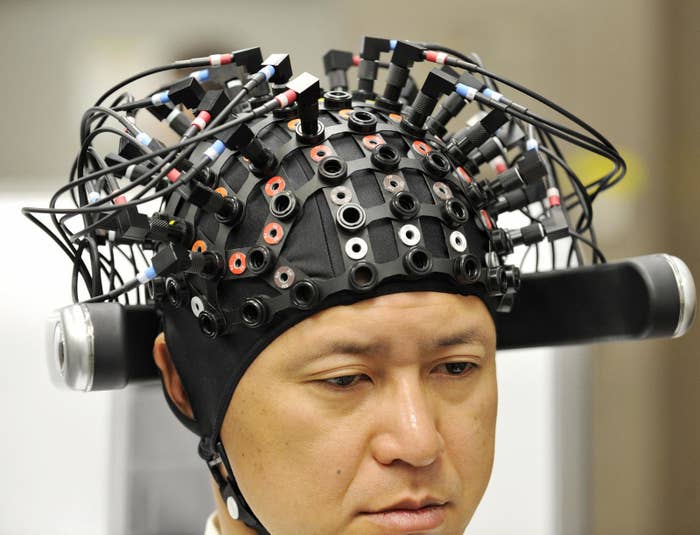
In a 2015 Q&A, Facebook CEO Mark Zuckerberg argued that the future of communication may well be telepathy. "One day, I believe we'll be able to send full rich thoughts to each other directly using technology," he said. "You'll just be able to think of something and your friends will immediately be able to experience it too."
Now, two years later, Facebook is working hard to make Zuckerberg's futurist vision a reality. And Regina Dugan — who headed up both the Defense Advanced Research Projects Agency (DARPA) and Google's Advanced Technology and Projects group — is leading the effort. Onstage at Facebook's F8 conference Wednesday, Dugan provided concrete details on the company’s telepathy efforts for the first time, introducing a research initiative she hopes will someday enable us to type words into Facebook posts simply by thinking them.
“We have a goal of creating a system capable of typing 100 words per minute ... straight from your brain.”
“It sounds impossible, but it’s closer than you may realize,” Dugan said. “We have a goal of creating a system capable of typing 100 words per minute — five times faster than you can type on your smartphone — straight from your brain.”
For Dugan, who runs Facebook's secretive research and hardware lab Building 8, the idea of such a brain-computer interface is not nearly far-fetched as it might sound. More to the point, it makes good sense. Thinking our words into a computer would likely be more efficient than manually typing them. And thinking commands into our smartphones could free us from staring at them so much, giving us more time to engage with the world around us. It too could make glasses overlaying digital information on the real world feel natural, since we wouldn’t have to operate them clunkily via touch or voice. “Even something as simple as a 'yes,' 'no' brain click would fundamentally change our capability,” Dugan said.
It remains to be seen if Facebook can develop such a technology and widely deploy it. But should it manage to do so it’ll likely encounter a perhaps more monumental task: convincing people to trust a company with a bumpy history of privacy missteps with their brains (remember Beacon?).
Well aware of such concerns, Dugan stressed that Facebook is taking a measured approach to these new brain-computer interfaces. “To be clear, we are not talking about decoding your random thoughts,” she said. “We’re talking about decoding those words, the ones you already decided to share, by sending them to the speech center of your brain.”
"To be clear, we are not talking about decoding your random thoughts."
Dugan’s emphasis on thought-typing’s tie to voluntary human decisions could be the foundation of Facebook’s “trust us” pitch for such technology. You typically don’t move your arm unless you want to do so; you typically don’t speak without intending to say something; presumably you won’t think things into Facebook unless you choose to do so.
There will be hardware involved, of course. Dugan told BuzzFeed News that thought-typing will likely be done via an electronic headband or augmented reality glasses — or perhaps something the team hasn’t thought of yet. Asked if she thought people might be hesitant to wear such a Facebook-developed device, Dugan parried the question. “I want to be careful not to dial forward to a whole slew of potential hypotheses of what might and might not occur,” she said.
But Dugan did stress that Facebook isn’t blindly pursuing technological advancement without considering the implications. “We ask questions about technological progress and we always will,” she said. ”I feel optimistic about technological progress; I also feel responsible for doing the right things.”
